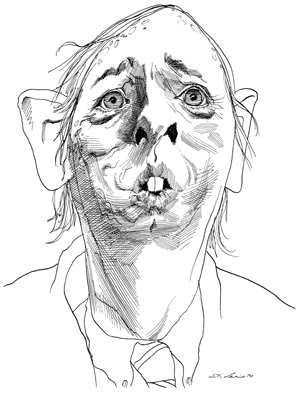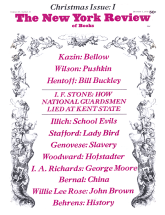Through most of the Sixties, there had been something in the air about Mr. William Buckley that had the tone of tinkling bells, of games played in a courtyard, of mime shows and chivalric songs. We never quite believed in him; knew that his performances, so artfully arranged for our enjoyment, were, in fact, rather a mockery of that society he represented—the world of vested interest, inherited privilege, and noblesse oblige. It was for us that he cultivated the languorous nasal drawl and stammer of the parody British peer, the Italianate flashing eye, the stylized syntax, the bad-pope smile. And we were grateful for such an ornamental villain who, while gracing the far right end of the panel, the other lectern in a debate, by his very manner proclaimed the anachronism of the ideas he espoused. While the other non-specialists of the right most often appeared to be either fools or fanatics, Mr. Buckley knew how to play the game, understanding always that theater was the politics of the Sixties.
We were not always so light-hearted about him nor he about us. During an earlier period, in Joe McCarthy’s time (known in Mr. Buckley’s lexicon as the anti-McCarthy era), Mr. Buckley; acting as an agent of the dark lord himself, seemed along with Roy Cohn and David Schine to be part of a new guard of young acolytes of repression. But those were the days when political lines were clearly drawn and we were more sober about our associations and less inclined to sup with the devil.
It was also in the Fifties that William Buckley and several siblings set out to be the scourge of Keynesian economists and godless collectivists that Mr. William Buckley, Sr., had trained his children to be inculcating them all with his religious and political principles, and making sure they would march to no other drum.
At times it has occurred to me that a parent who wished to be assured of compatible progeny would have been well advised to eschew child psychologists and to seek out instead the elder Kennedy or the senior Buckley. Were there ever two men so successful in getting the children they wanted rather than those they deserved? As the young Buckleys worried the prevailing culture, the Kennedys, reared to lead, moved into positions of power. It probably would have been as much of a surprise to Mr. Buckley, Sr., as it was to us in New York to find that, after all that family-swimming upstream, his son James has captured Robert Kennedy’s Senate seat for the Conservative Party. A minority victory, true—but one that rode a tide.
And Mr. William Buckley has been riding a tide himself. Much in demand on lecture platforms around the country, he presides over a national television debate show, writes a column which appears in over 300 newspapers, and publishes books and articles which are widely read and wryly admired. If one did not follow him too closely over the years, it would be possible to consider him merely an elegant spokesman for the far right and to allow him his lapses in taste and humanity, his petty bitchery, as marks of the solitary eccentric.
But in Mr. Buckley’s most recent collection of essays, The Governor Listeth, we come upon him in the middle of a journey toward a rather awful kind of moderation. True, the old wild Buckley is still there at times, as when he transmits the astonishing knowledge that “in New York City, one half of the chronically poor are disorganized poor who cannot be persuaded even to flush their own toilets.” (One wonders how he knows.) On the whole, however, he is now more aware of consequence, as he moves away from the absence of power, that condition which was his abiding charm.
Mr. Buckley is now a member of the advisory board of the USIA. As I write this, he is conferring with Mr. Nixon in the Bahamas. And we will soon begin to know how much influence he can exert on the Senate by shaping the extraordinarily unformed political thought of his brother.
The change in his own thought has, in part, been forced. What happened to Mr. Buckley, along with the rest of us, was the breaking down of traditional ideological compartments, the blurring of traditional alliances and enmities. Not only did the old New Deal and New Frontier politics lose credence with the left, but the left then walked off with the conservative banners of nonintervention, freedom from governmental coercion, rugged individualism, decentralization, and, in some cases, racial separatism.
Mr. Buckley, looking for new ground in the shifting sand, now writes of the “new conservatism” which concerns itself with such things as: the democratic process (“the rights of the authorities of Harvard, over against the mobocratic demands of students and faculty”); due process (“how valuable due process becomes up against the Marcusean furies”); upward mobility (“for which purpose the new conservatives are giving the free marketplace something of a hand—for instance, by preferential hiring of Negroes”).
Advertisement
It appears that Mr. Buckley is beginning to take on the weight of middle-aged responsibility, sounding more often like a resilient prince of the Church than like a purifying spirit. When one reads, for instance, that “the government has the responsibility to declare hopelessly irresponsible parents unqualified to bring up children, who could then be turned over to charitable organizations to bring up,” one realizes that Mr. Buckley is very far from either the radical right or the conservative libertarians. He even brings to mind Norman Podhoretz—particularly Podhoretz’s plea for miscegenation as the solution to the Negro problem—in an essay wherein Mr. Buckley advances the notion of the healing value of actively encouraging the election of a Negro President.
That Mr. Buckley is no longer to be taken in fun is nowhere more evident than in his report of an exchange between himself and the ultimate libertarian, Mr. Milton Friedman. Mr. Buckley’s position was that “Narcotics is a plague” and as such, “The powers of the state are conceded in the matter of quarantine”:
I asked Professor Friedman, “Is it your position that, assuming the community decided to license the whores, it would be wrong to insist that they check in at regular intervals for health certificates?” Yes, he thought that would be wrong—“After all, if the customer contracts a venereal disease, the prostitute having warranted that she was clean, he has available a tort action against her.”
To which Mr. Buckley moralizes, “The articulation of libertarian theory to such lengths as Mr. Friedman is able to take it ought to be understood as a form of intellectual sport…. But it is terribly important not to take this kind of thing seriously.”
Perhaps Professor Friedman should be considered as a replacement for the role from which Mr. Buckley has so clearly—and perhaps regretfully—withdrawn.
This Issue
December 3, 1970




